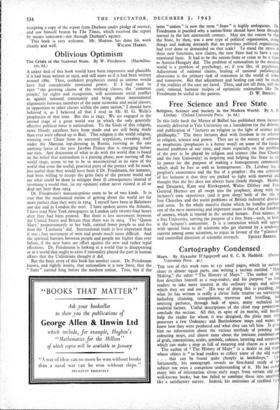Free Science and Free State
Religion, Science and Society in the Modern World. By A. D. Lindsay. (Oxford University Press. 3s. 6d.)
IN this little book the Master of Balliol has published three lectures recently delivered at Yale University on a foundation for the delivery and publication of "lectures on religion in the light of science and philasophy." The three lectures deal with freedom in its relation to religion, science and power. They are in the nature of sermons or prophecies (prophecies is a better word) on some of the funda- mental problems of our time, and most especially on the problem of the part to be played by religion and science- (the free Church and the free University) in inspiring and helping the State to ase its power for the purpose of making a homogeneous community which shall be free as well as homogeneous. Dr. Lindsay has a prophet's earnestness and the fire of a prophet : the one criticism of his lectures .is that they are packed so tight with material and thought that the fire does not always burn clearly through. Hobbes and , Descartes, Kant and Kierkegaard, Walter Dilthey and Frau Gertrud Hermes are all swept into the prophecy, along with the lecturer's own experience (and it goes deep) both of the life of free Churches and the social problems of British industrial districts and areas. In the whole massive theme which he handles perhaps one of the most interesting and important issues is that of the freedom of science, which is treated in the second lecture. Free science, in a free University, serving the purpose of a -free State—such, in brief, is the lecturer's contention. It is a contention which will appeal with special force to all scientists who get alarmed by a tendency, current among some scientists, to argue in favour of the "planned" and controlled direction of scientific research. ERNEST BARICER.


























 Previous page
Previous page